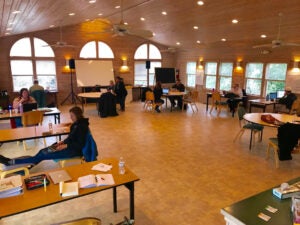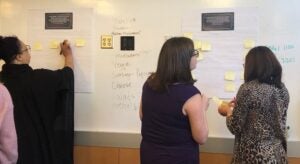Spring WAC Academy & Faculty Writing Retreat
Here are two examples of the ways the UWP are supporting faculty as writers and teachers of writing each spring semester: the Faculty Writing Retreat and WAC Academy.
Supporting faculty as writers
Since spring 2016, the Faculty Writing Retreat has been offering low-cost getaways that provide time for faculty from across the disciplines to dig into their own writing projects over ECU’s Spring Break. Faculty have the option of staying 2 or 3 nights at the Trinity Center in Salter Path, NC (near Atlantic Beach). The UWP pays ½ the cost, and each person is responsible for securing matching funding. The remaining money can come from a writer’s department/college, or participants can pay for it themselves. While the UWP does not provide transportation, we do help organize carpooling for those who are interested.


Under the canopy of the maritime forest, the casual setting of the Trinity Center provides rooming, meals, snacks, and an oceanfront writing space. While participants determine how they spend their writing time, the UWP provides guidance on setting writing goals and developing a writing plan along with opportunities for thinking and feedback partners. This retreat is a great way to assure you will get ahead over the break while not having to worry about cooking, cleaning, and other distractions.
Supporting faculty as teachers of writing
The Writing Across the Curriculum (WAC) Academy is a professional development series offered each spring that invites 10 instructors from across the disciplines to participate in a 6-week inquiry into critical questions: What is good writing? and What is effective writing instruction? With the Academy’s slogan of “Writers Teaching Writing”, participants are asked to critically examine their own writing practices to develop awareness of and insight into writing as a rhetorical and recursive process. Participants explore research on writing and learning, dissect elements of meaningful writing assignments, consider issues related to teaching grammar and mechanics, reflect on methods to encourage the transfer of writing skills, debate the use of new literacy technologies, and share writing-related teaching strategies they have used successfully in helping their students become better writers and thinkers. As faculty build knowledge of writing and connections with peers, they gain more effective writing curricula, assignments, and practices to take into their writing classrooms.

